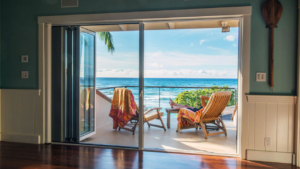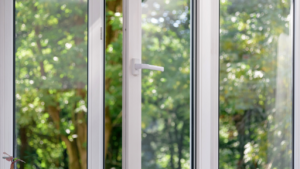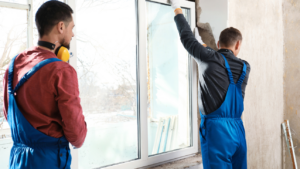Welcome to sunny Southern California, where homeowners cherish the year-round sunshine and perfect weather! However, enjoying that beautiful climate comes with its own set of challenges, like unwanted insects, allergens, and rising energy costs. In this article, “Boost Curb Appeal & Energy Efficiency with Screens,” we’ll explore how upgrading your window screens, door screens, and window seals can transform your home, making it more comfortable, energy-efficient, and visually appealing.
Enhance Your Home & Energy Efficiency with Screens
Upgrading your home with energy-saving window screens can be a game-changer for property owners. Not only do these window screens keep your home cool during the hot summer months, but they also help reduce your energy bills. By allowing fresh air to circulate throughout your home while keeping the sun’s heat at bay, energy-saving window screens can significantly reduce your reliance on air conditioning.
Additionally, these window screens offer protection against harmful UV rays, which can cause fading and damage to your home’s interior. By investing in high-quality energy-saving window screens, you’re ensuring your home stays cool, comfortable, and protected from the harsh Southern California sun.
Insect Protection for SoCal Homes
One of the most significant benefits of upgrading your window and door screens is the insect protection they provide. By installing high-quality window and door screens, you’re creating a barrier that prevents insects from entering your home while still allowing fresh air to circulate. This not only keeps your living spaces bug-free but also contributes to a healthier and more enjoyable indoor environment for you and your family.
Boost Curb Appeal in Southern California
Window and door screens may not be the first thing you think about when it comes to boosting your home’s curb appeal, but they can make a significant difference. By investing in new, high-quality window and door screens, you’re not only improving your home’s aesthetics but also increasing its value. Upgraded screens can also contribute to better energy efficiency, which is an attractive selling point for potential buyers.
Top Window & Door Screen Tips
When selecting window and door screens for your Southern California home, consider the following tips:
- Choose screens with a tight weave to keep out smaller insects and provide better protection against allergens.
- Opt for solar screens to block heat and UV rays, improving energy efficiency and protecting your home’s interior.
- Ensure proper installation and maintenance to extend the life of your screens and maximize their effectiveness.
By keeping these tips in mind, you can make the best decision for your home and enjoy the benefits of upgraded window and door screens.
Window Screen Upgrades: A Smart Investment
Upgrading your window screens is a smart investment that offers numerous benefits for Southern California homeowners. Not only do they improve your home’s curb appeal and energy efficiency, but they also provide protection against insects, allergens, and UV rays. By installing high-quality window screens, you’re enhancing your home’s comfort, safety, and overall value.
Boost Curb Appeal with Window & Door Screens
In Southern California, energy efficiency is a top priority for homeowners looking to save on utility costs and reduce their environmental impact. Upgrading your window and door screens is a cost-effective home improvement that can significantly boost energy efficiency.
High-quality window and door screens help regulate indoor temperatures by allowing fresh air to circulate while keeping heat and harmful UV rays out. This reduces your reliance on air conditioning and helps lower your energy bills. Moreover, energy-efficient screens can insulate your home during cooler months, keeping your living spaces warm and cozy without excessive heating costs.
Allergy Protection for Southern California Homes
For allergy sufferers, Southern California can be a challenging environment. Upgrading your window screens is a simple yet effective way to protect yourself and your family from allergens. High-quality screens with tight weaves can trap pollen, dust, and other allergens, preventing them from entering your home.
By upgrading your window screens, you’re creating a healthier living environment and reducing allergy symptoms for you and your family.
Improve Comfort & Efficiency
In addition to window screens, upgrading your window seals is another crucial step in improving your Southern California home’s comfort and energy efficiency. Over time, window seals can wear down, allowing drafts to enter and conditioned air to escape.
By replacing worn or damaged window seals, you’re preventing drafts and ensuring your home stays comfortable and energy-efficient. Combining upgraded window seals with high-quality window screens can make a significant difference in your home’s overall performance and value.
Tashman Red Carpet Treatment
When it comes to screen replacement or repair, Tashman Home Center utilizes its own crews including installers who are highly-seasoned professionals – we never hire third-party subcontractors! The replacement and installation of screens are guaranteed by a warranty, and if we do the installation, you will enjoy the peace of mind knowing our work is done right the first time. Find out more about our Installation, Repair and Replacement Services.
Connect with Your Neighborhood Tashman Team Today!
For immediate assistance with questions, quotes, scheduling a FREE CONSULTATION or product information, call 323-656-7039 or use our online Contact Us form to schedule a quote or free consultation. And if you’re looking for hardware, look no further than Tashman/Ace. Visit us at 7769 Santa Monica Blvd. West Hollywood, CA 90046 or shop online at tashmanace.com. Contractor License #298720.



